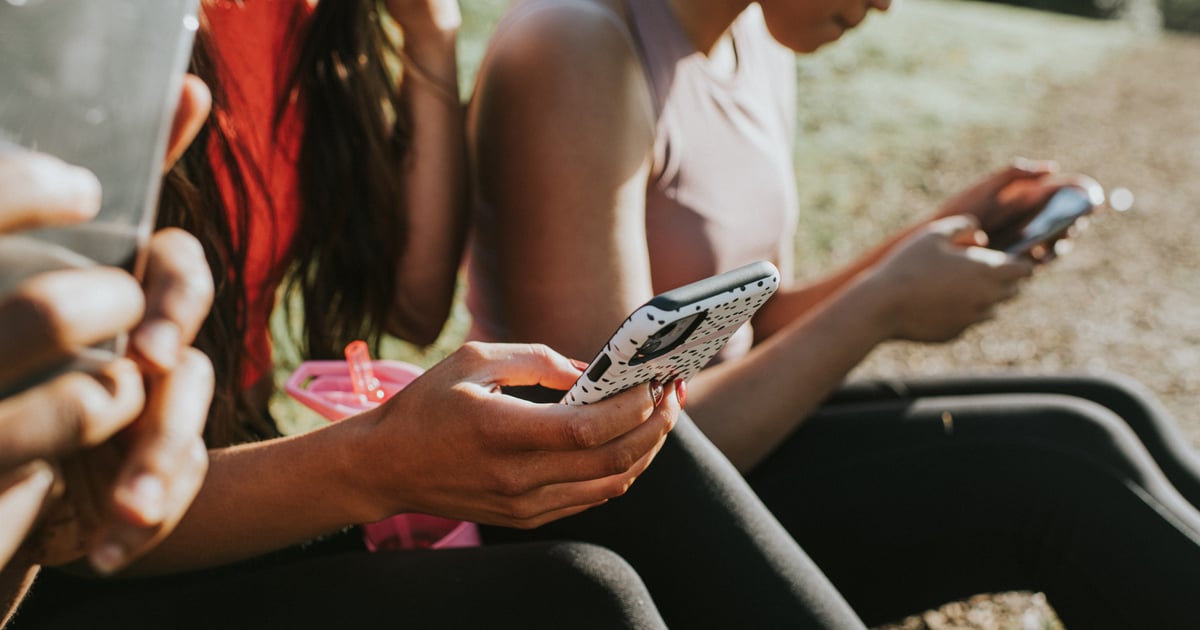Products You May Like

Move over TikTok and BeReal, a new app has entered the villa — and it has officially overtaken both aforementioned platforms in the Apple App Store rankings. The Gas app is all about positivity, with its name a reference to “gassing someone up” — aka boosting their self-confidence.
The Wall Street Journal summarized it perfectly: “The hottest app right now? One where teens have to say nice things about each other.” Basically, it allows users to send anonymous compliments to each other through polls. And if the name itself isn’t proof enough that the app was made for Gen Z, it’s specifically being marketed towards high schoolers in an effort to foster ~good vibes~ in a smaller social network.
Gas is proof that not all social media is toxic. The platform recently shared screenshots of users sharing their experience with the app and it is, frankly, adorable. One user writes, “It’s a really good app to know that people love you and care for you. Whenever I’m sad or not feeling my best, Gas is a great way to cheer me up and give me a compliment.”
Gas has also demonstrated the important role it can play in forming community. “At my school, we recently lost someone to suicide. Having this app to make everyone feel loved was a great way for the school to come together and try to prevent it from happening again. If only it was available for him to see how loved he was ❤️”
The wholesome concept is a refreshing take on social media and we hope it’s a trend that’s here to stay.
This is why the Gas app exists. pic.twitter.com/JVxZ6WOhpM
— Gas (@gasappteam) October 25, 2022
What Is the Gas App?
Gas is only available for iPhone users in 12 states, but has plans to expand nationwide. For those who have access to the service, it’s currently a big hit among teenagers. Since its launch in August, Gas has been downloaded 500,000 times, according to analytics provider Data.ai.
The founder of Gas, Nikita Bier, isn’t new to building popular social apps. He built a similar app called tbh, an abbreviation for “to be honest” which gained over 5 million users before it was bought by Facebook in 2017. He told Bloomberg, “The reason I built it was because I wanted to bring back what tbh did for so many kids five years ago, which was raise self-esteem and spread positivity.”

Image Source: Apple App Store, Gas
How Does Gas Work?
Similar to yearbook superlatives, Gas uses polls for people to vote and send anonymous compliments to their friends and peers. The key is: it’s all positive. The niceness is guaranteed by only offering limited options pre-written by the company, like “Should DJ every party.” The gaming aspect is you collect coins every time you answer a poll and then can use them to reveal the gender and grade of the voter. If you upgrade to “God Mode” version for $7 a week, it drops hints about who voted for them and bonuses that unveil the identity of the voter, among other features.
What Does the Future of Gas Look Like?
While it’s currently being marketed towards high schoolers, this millennial has high hopes it begins to circulate among adults, too. We could all use an anonymous, mood-boosting compliment every now and then.
However, there are already conspiracies around the app being a breeding ground for sex trafficking. The fear stems from the apps’ request for location data, which is used to determine schools nearby. Bier has called it a “hoax” and said the rumors have resulted in three percent of users deleting the account in one day. “Well, it was fun ride to the top,” he tweeted. “The internet cannot be tamed.” According to Bier, Gas doesn’t allow messaging and the company doesn’t track or save users’ locations or sell personal data to third parties.
Technology columnist for the New York Times, Kevin Roose, says while Gas is doing well now there’s always possible growing pains ahead. “No social media giant lasts forever, and it may be a new generation’s turn in the spotlight.” Bier acknowledged to Bloomberg that Gas’s popularity may be fleeting, but worth it: “Only if this lasts for a period of time, kind of a hit like a game for a fleeting moment, that impact would still be so meaningful for millions of teens.”
Image Source: Catherine Falls Commercial / Getty
